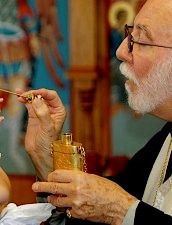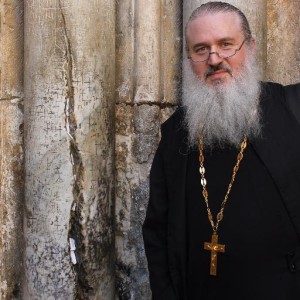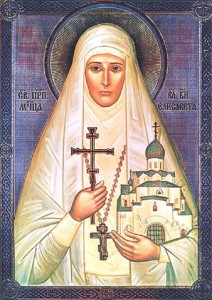Another excellent post from our friend, Fr. John Whiteford in his ‘Stump the Priest’ series.
 Question: “I am/was a Baptist convert to Orthodoxy, and though it’s been many years (about 20) that I was accepted into Orthodoxy through Chrismation, I have read things in the Rudder, and Canons which state that this was an anathema to the faith of the Church. I still, after all these years, feel that I should have been Baptized, and yet I have done other Sacraments in the Church. I have a certificate of Chrismation, but I still feel very uncomfortable! Should I be baptized in the Orthodox Church now?”
Question: “I am/was a Baptist convert to Orthodoxy, and though it’s been many years (about 20) that I was accepted into Orthodoxy through Chrismation, I have read things in the Rudder, and Canons which state that this was an anathema to the faith of the Church. I still, after all these years, feel that I should have been Baptized, and yet I have done other Sacraments in the Church. I have a certificate of Chrismation, but I still feel very uncomfortable! Should I be baptized in the Orthodox Church now?”
The short answer is “no”.
But to get to the longer answer, there are several things to consider here:
If the question is should a Baptist, who has been baptized by a single immersion, be received by chrismation? — my answer would be that I do not believe that they should. The reason for this is that being baptized by triple immersion (or pouring, in cases of necessity) in the name of the Trinity is the canonical standard of a baptism that is valid in outward form. Canon 7 of the Second Ecumenical Council lists various groups that would either be received by confession of faith, or by chrismation, but specifically mentions that the Eunomians “who are baptized with a single immersion” are to be received by baptism. Of course there are bishops and jurisdictions that take the position that anyone who is baptized in the name of the Trinity should be received by chrismation, even when only baptized by a single immersion, and that is why you were received the way that you were.
The historic practice of the Russian Church has been to receive Monophysites, Roman Catholics, Reformed (Episcopalians, Presbyterians), and Lutherans by economia. Since the 70’s, the practice of the Russian Church Outside of Russia has been to baptize all converts as a rule, unless the bishop gives a specific blessing to receive someone by economia.
 Another question we should consider is how does the Church view the baptisms of those outside of the Church? True baptism unites one to the Church, and obviously, those who are baptized outside of the Church are not united to the Church by their baptism. We pass no judgment on the souls of those outside of the Church, and leave that question in the hands of God, but we can say that at least in this life, they remain outside of the Church until and unless they are received into the Orthodox Church.
Another question we should consider is how does the Church view the baptisms of those outside of the Church? True baptism unites one to the Church, and obviously, those who are baptized outside of the Church are not united to the Church by their baptism. We pass no judgment on the souls of those outside of the Church, and leave that question in the hands of God, but we can say that at least in this life, they remain outside of the Church until and unless they are received into the Orthodox Church.
In the early Church there was a dispute about whether converts who had been baptized by heretics or schismatics should be baptized or not. St. Cyprian of Carthage took the position that they should, and he presided over a council in Carthage that declared there is no true baptism outside of the Church. And this canon was affirmed by the Sixth Ecumenical Council in its second canon. However, that same canon also affirmed the canons of St. Basil, and his first canon, provides a bit more nuance. He agreed that the Church is under no obligation to recognize baptisms that take place outside of the Church, but states that for the sake of “economia” the Church may do so, though he also noted that in different regions, different practices prevailed when it came to how certain heretics or schismatics were received.
So what happens when the Church accepts a baptism that was done outside of the Church, by economia? St. Augustine compared baptism to the “military mark” which was a tattoo a soldier was given when entered the Roman Army, and it showed what commander he belonged to. St. Augustine said that such a mark could be retained by deserters (schismatics), and it could illicitly be given to those who had never been in the army, and yet unless and until such men actually joined (or rejoined) the army, those marks did not have the real significance that they should have… however if they did rejoin or join the army, the mark would not need to be redone. And so what happens when someone is received by economia is they are finally united to the Church, and their baptism is then given the real meaning of what true baptism is.
But getting back to the question of what to make of someone who had been baptized by a single immersion, and was received by economia — even though, as I said, I do not agree that this should have been done; the fact is that it has been done. Bishops, as successors of the Apostles have the power to bind and to loose (Matthew 18:18), and so when the bishop over the parish that you were received in made the decision that this is how you should be received, you were truly received into the Church. If anyone will have to answer for that, it will be the bishop, and not you. And so I would not allow yourself to be troubled by this question any further.
Fr. Seraphim (Rose) was a Methodist who was received by Chrismation under the authority of St. John of Shanghai.
The New Martyr Elizabeth Fyodorovna was a Lutheran, who was received by Chrismation prior to the revolution, and is now a highly venerated saint of the Church.


